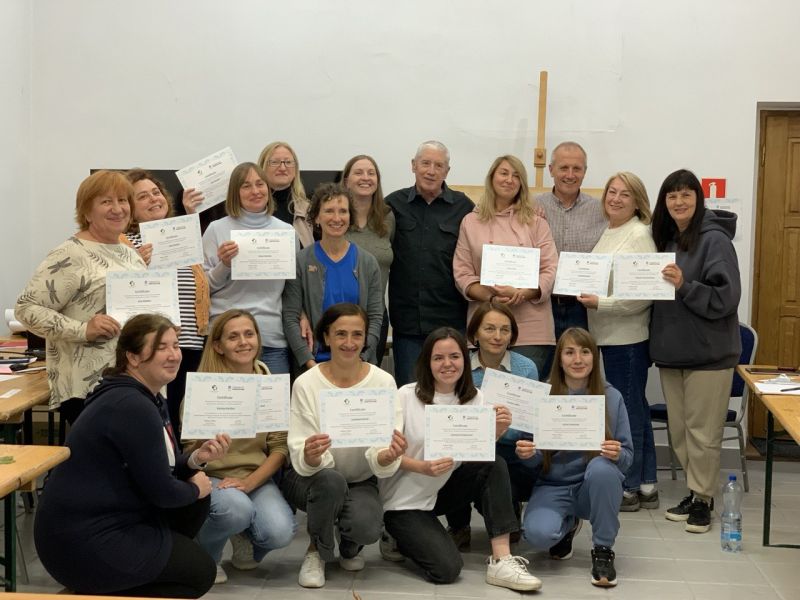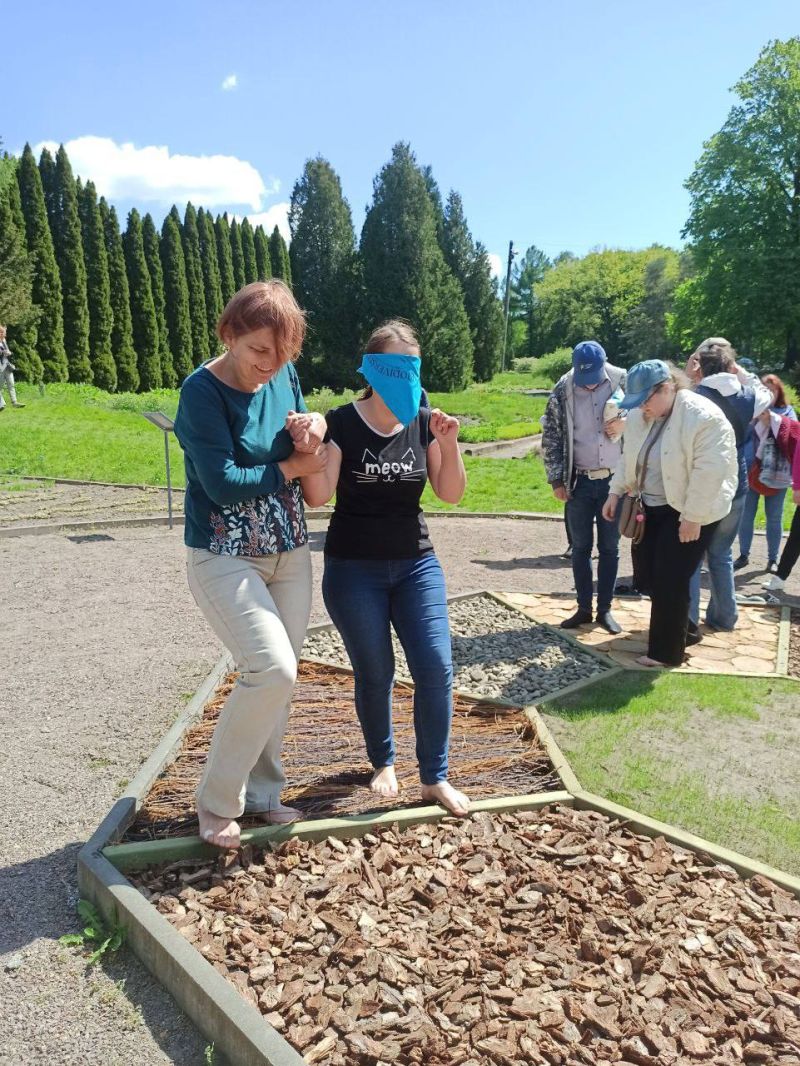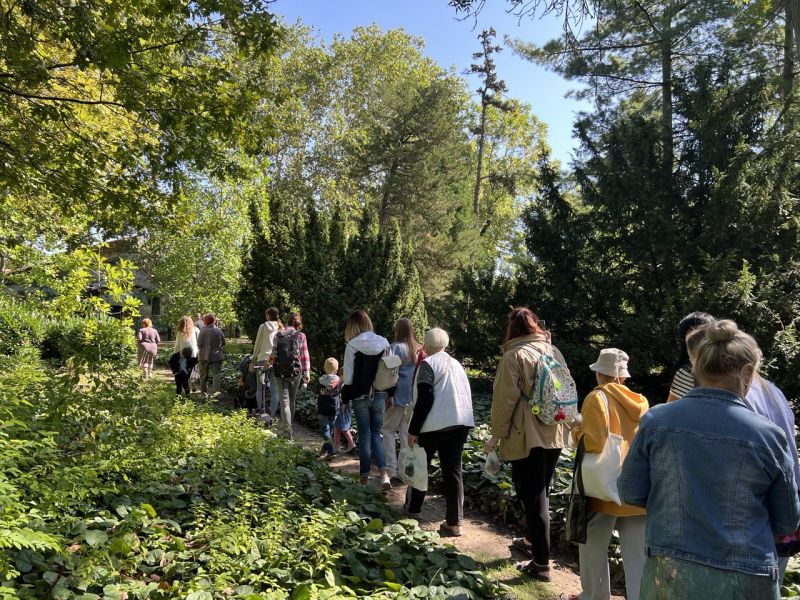Roots of Resilience: Therapeutic Horticulture in Wartime Ukraine
Story Content
In the midst of the devastation caused by the ongoing war in Ukraine, many are finding solace in an unexpected place: botanical gardens. Across the country, garden staff are inviting community members to plant flowers, tend vegetable beds, and reconnect with nature to restore a sense of peace and purpose.
This approach is part of a broader practice known as therapeutic horticulture (TH), which is the facilitated use of gardening and other nature-based activities to promote goals of healing and growth. Helping to lead this effort is Partnerships for Nature, a non-profit based in Washington State that supports international environmental education and community building. In 2024, the organization partnered with the leaders of a collaborative TH Certificate program developed by the North Carolina Botanical Garden and the NC State University Extension Gardener Program to bring TH training to Ukraine.
Ukrainian trainees received instruction in the foundational principles and practices of TH through a combination of online sessions and a three-day in-person workshop in Poland. Partnerships for Nature organized and oversaw these training sessions, ensuring that the program covered not only principles of program development, evaluation, and fundraising but also emphasized therapeutic activity selection and mental health support skills—an area new to many educators from plant science backgrounds.

Participants receiving certificates after completing a three-day therapeutic horticulture workshop in Poland, October 2024.
Emilee Weaver, former Manager of Therapeutic Horticulture Programs at the North Carolina Botanical Garden and current Director of Learning & Community Engagement at Root in Nature, played a key role in administering the TH training in Ukraine.
“They’ve been so receptive and so hardworking,” Emilee observes of the participants. “They show up to every meeting—even if their lights are out because of an air raid. I really get the sense that they feel like this is their contribution, that this is the way that they can give back and serve their country. I think it’s really noble and beautiful.”
When your life is destroyed, when your world is destroyed, you can grow something. You can plant, you can hope, you can expect something.
Partnerships for Nature’s Board President, Anthony Allison, adds that “most of the people are PhD level botanists who are caring for a botanical garden. It’s a full-time, difficult job. They’ve done this training in TH on top of everything else, and often on their own time because they care so much. They were eager to do something concrete and tangible to help their country and fellow Ukrainians.”
Botanical gardens in cities like Odesa, Kyiv, Lviv, Kryvyi Rih, and Chernivtsi are now using TH to support recovery from trauma caused by the war. These programs, usually provided at no cost, address a wide range of populations, including veterans, people displaced by the conflict, and children with developmental disabilities. In 2024 alone, the TH programs reached over 2,000 people.
Emilee notes that one of the strengths of TH is its flexibility to work with groups of varying sizes and to be tailored to distinct needs. “There are so many different benefits—emotional, cognitive, social, physical, vocational, spiritual,” she remarks. “That’s the difference between TH and regular gardening: you’re working towards a specific goal.”
Yulia Galis was among 10 Ukrainian botanical garden educators awarded a TH certificate in June 2025. Yulia first began volunteering at the Odesa Botanical Garden after the war broke out, stepping in to help amid staff shortages caused by the conflict. Now a full staff member, she uses therapeutic horticulture to nurture well-being in her community.
Discussing the TH workshop she attended in Poland, Yulia explains that “the training wasn’t just about training. It was about inspiring us and giving us strength. We had a chance to learn, to meet each other, and to speak about something outside of our current reality. We thought it was really relevant and needed in our country.”
Yulia highlights the power of shared time outdoors while doing tasks like watering, weeding, and harvesting crops: “When we work with people with intellectual disabilities, for example, they may seem shy at first and have a hard time communicating. But after an hour-long session or being in nature doing something together, they open themselves up.”

A tactile circle in Lviv Botanical Garden provides opportunities for sensory exploration.
Therapeutic horticulture also offers agency and a sense of normalcy—especially for many Ukrainians with deep family ties to gardening who have been displaced from their homes. “Growing things gives you this sense of controlling something,” Yulia says. “When your life is destroyed, when your world is destroyed, you can grow something. You can plant, you can hope, you can expect something. It gives you some idea of your life.”
Beyond personal healing, botanical gardens cultivate joy and connection. “People really underestimate the power of beauty and leisure. I didn’t understand that nearly as deeply until I worked with this Ukrainian project,” Emilee reflects. “In Lviv, they put in a sensory pathway where you walk barefoot around a circle with all these different natural objects beneath your feet. Seeing the families, the kids, the adults, just walking around this little circle laughing, talking, and engaging with each other . . . That moment for them, in a time of war when they’re seeing so much ugliness in humans and the destruction of their beautiful land, they get this window of peace and beauty.”
Looking ahead, plans are underway to translate even more TH materials into Ukrainian and to expand programs throughout the country in botanical gardens, hospitals, and other spaces. While Partnerships for Nature continues to prioritize Ukraine, it is also broadening its efforts to other regions, including Armenia and Georgia. As TH blossoms across Ukraine and beyond, hope and resilience are taking root where they’re needed the most.
For more information about Partnerships for Nature and their work in Ukraine, please visit https://www.partnerships-for-nature.org or contact Anthony Allison at anthonypallison@gmail.com.

Walking through the Odesa Botanical Garden offers visitors a chance to connect with nature.
Associated Case Study: Helping Ukraine Heal Through Nature-Based Programs